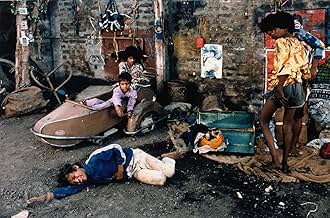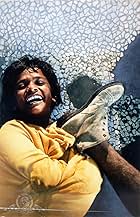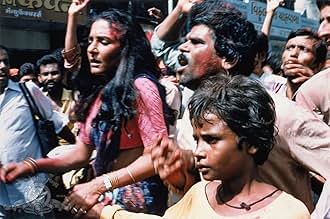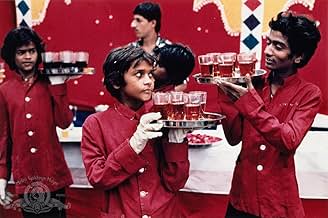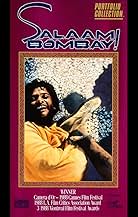AVALIAÇÃO DA IMDb
7,9/10
11 mil
SUA AVALIAÇÃO
Adicionar um enredo no seu idiomaYoung Krishna struggles to survive among the drug dealers, pimps, and prostitutes in the back alleys and gutters of India.Young Krishna struggles to survive among the drug dealers, pimps, and prostitutes in the back alleys and gutters of India.Young Krishna struggles to survive among the drug dealers, pimps, and prostitutes in the back alleys and gutters of India.
- Direção
- Roteiristas
- Artistas
- Indicado a 1 Oscar
- 13 vitórias e 8 indicações no total
Ram Murthy
- Mad Man
- (as Ram Moorti)
Sarfuddin Qureshi
- Koyla
- (as Sarfuddin Quarassi)
Anita Kanwar
- Rekha Golub
- (as Aneeta Kanwar)
Krishna Thapa
- Nepali Middleman
- (as Kishan Thapa)
Avaliações em destaque
A brilliant but sad film in which we follow abandoned Krishna on his quest to make enough money to return to his village. Along the way we meet the street kids, prostitutes, pimps and dealers he shares everyday life with.
An amazing aspect is that all the child actors in the film are real street kids picked after attending workshops run by Nair and friends. In particular the central performances of Krishna, Manju and Coalpiece (his songs!) are superb. Despite their hardships there are some great moments when you see glimpses of the playful kids within.
The film never wanders into over-sentimentality and at times its hard to believe you're not watching a documentary. Hindi-film music and escapism seeps into everyday life, actors mingle with ordinary people and the whole film is shot in real locations around Mumbai that just drip with atmosphere. This sadly includes the chiller room which was filmed as they found it along with the soul-crushing 'Flowers that never bloom' prayer.
The story wanders and can be slow but this only serves to draw you into their world and leave you sad and angry at the end - at the loss of childhood for these kids and countless others. Still relevant today.
An amazing aspect is that all the child actors in the film are real street kids picked after attending workshops run by Nair and friends. In particular the central performances of Krishna, Manju and Coalpiece (his songs!) are superb. Despite their hardships there are some great moments when you see glimpses of the playful kids within.
The film never wanders into over-sentimentality and at times its hard to believe you're not watching a documentary. Hindi-film music and escapism seeps into everyday life, actors mingle with ordinary people and the whole film is shot in real locations around Mumbai that just drip with atmosphere. This sadly includes the chiller room which was filmed as they found it along with the soul-crushing 'Flowers that never bloom' prayer.
The story wanders and can be slow but this only serves to draw you into their world and leave you sad and angry at the end - at the loss of childhood for these kids and countless others. Still relevant today.
This is one of the single most powerful films I've ever seen. Having been to India several times and knowing to an extent what it's like for the poor kids that have to make it on the streets, it really gets to me. I know that it received quite a bit of critical acclaim when it came out, but I didn't discover it until recently, and, judging from the number of votes that its gotten on this site, it doesn't seem as though too many people have seen it. I hope more people do; these kids don't have much of a voice in their own country, let alone the rest of the world, but movies like this give them one and it should be heard by everyone.
Like the 'Square Circle' which came after it, Mira Nair's film is a wonderful counterpoint to traditional Bollywood cinema, depicting issues that many in India would like conveniently swept under the carpet. Filled with humanity and compassion, the film does have a parallel with Bollywood dramas as it too is about 'escapism'. However, the story shows how these dreams are illusory; the silent 'Sweet Sixteen' showing her romantic photograph - a pretence - as her brothel madam hawks her virginity to a prospective buyer; Krishna's hopes of being forgiven and returning home to his family; the prostitute Rekha's hopes of a 'family life' with the pimp Baba.
I particularly liked the way Nair paralleled childhood innocence with adult cynicism and cruelty. The final scene where Krishna the teaboy weeps for his lost innocence and at what he has become is very moving; like the drug-addict Chillum, he has 'forgotten' how he first came to Bombay and now only sees a life of despair and suffering.
I particularly liked the way Nair paralleled childhood innocence with adult cynicism and cruelty. The final scene where Krishna the teaboy weeps for his lost innocence and at what he has become is very moving; like the drug-addict Chillum, he has 'forgotten' how he first came to Bombay and now only sees a life of despair and suffering.
This is one of the single most powerful films I've ever seen. Having been to India several times and knowing to an extent what it's like for the poor kids that have to make it on the streets, it really gets to me. I know that it received quite a bit of critical acclaim when it came out, but I didn't discover it until recently, and, judging from the number of votes that its gotten on this site, it doesn't seem as though too many people have seen it. I hope more people do; these kids don't have much of a voice in their own country, let alone the rest of the world, but movies like this give them one and it should be heard by everyone.
Came across this film on a Public channel last night, by mistake... or should I say, by luck! Amazing film, so many layers deep, it got me thinking. I've been a fan of Mira's work since "Mississippi Masala", but had never heard of Salaam Bombay. She demonstrates in this fine film a sense of lighting and composition that's nothing short then breathtaking. The locations were rich as the characters, the acting was touching and sincere... this is a film I won't forget.
Você sabia?
- CuriosidadesIrrfan Khan made an appearance in this film as a writer, one of his first appearances.
- Erros de gravaçãoKrishna starts off with eight glasses of tea. One glass is broken by Sweet Sixteen when he offers her a drink. He is then seen walking back to the tea stand with eight full glasses, but when he gets back he has seven empty glasses.
- Citações
Rekha Golub: [To Baba] Just like a customer.
- Cenas durante ou pós-créditosEnding credits: no guts no glory 52 locations 52 days what problem? no problem
Principais escolhas
Faça login para avaliar e ver a lista de recomendações personalizadas
- How long is Salaam Bombay!?Fornecido pela Alexa
Detalhes
- Data de lançamento
- Países de origem
- Central de atendimento oficial
- Idiomas
- Também conhecido como
- Hello Bombay!
- Locações de filme
- Empresas de produção
- Consulte mais créditos da empresa na IMDbPro
Bilheteria
- Faturamento bruto nos EUA e Canadá
- US$ 2.080.046
- Faturamento bruto mundial
- US$ 2.080.758
Contribua para esta página
Sugerir uma alteração ou adicionar conteúdo ausente





